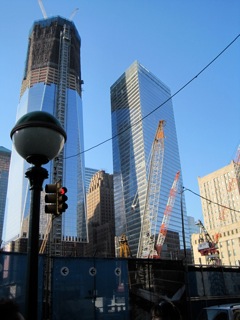 It’s a strange thing tripping through lower Manhattan these days. A few blocks beneath the rebuilding of One World Trade’s Freedom Tower, a project remarkably far along considering the glacial pace of most construction projects in this recession, stand The Occupiers.
It’s a strange thing tripping through lower Manhattan these days. A few blocks beneath the rebuilding of One World Trade’s Freedom Tower, a project remarkably far along considering the glacial pace of most construction projects in this recession, stand The Occupiers.
They numbered in the thousands last Saturday, in what was a surprisingly well-outfitted demonstration. What will become of the collective effort is a mystery. There’s little doubt that the snow storm that hammered them so early on in the season was orchestrated by Wall Street itself. As was we all know, companies like Goldman Sachs and JP Morgan control the weather along with the wealth in this country. Don’t doubt it for a second that this conspiracy is climatological as well as fiscal.
 There have been volumes of advice directed at The Occupiers in an effort to fortify the movement. The financial rape and dodging of responsibility has become a lightning rod for multiple schools of thought. Matt Taibbi of Rolling Stone has amassed the most impressive exegesis of criminal activity out there. Names and quotes and paper trails of top financial execs doing all kinds of illegal shit. How it can be published for all to read without a single executive being dragged away in cuffs is confounding. (Note: Goldman’s Rajat Gupta pleaded not guilty and has yet to be convicted.)
There have been volumes of advice directed at The Occupiers in an effort to fortify the movement. The financial rape and dodging of responsibility has become a lightning rod for multiple schools of thought. Matt Taibbi of Rolling Stone has amassed the most impressive exegesis of criminal activity out there. Names and quotes and paper trails of top financial execs doing all kinds of illegal shit. How it can be published for all to read without a single executive being dragged away in cuffs is confounding. (Note: Goldman’s Rajat Gupta pleaded not guilty and has yet to be convicted.)
So how much more explicit does this white-collar sadism have to get? How many more blows to the system can our country take? Is there any accountability to anyone anywhere? There are answers to these questions (we’re all masochists at heart), but the fact is, actions have begun speaking louder than words. Protest, something that has long been incumbent upon us all, is finally happening.
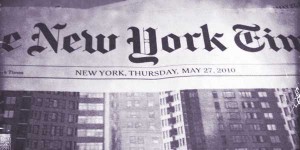
It must be one hell of a shot in the arm to wake up in a tent pitched on concrete in Zuccotti Park and hear philosophers like Slavoj Žižek or business leaders like Warren Buffet or New York Times Op Ed columnists addressing you directly. The suggestions from Zizek, Buffet, Krugman, Kristoff and Dowd are starting to get heeded. Because of them, generalizations like “equality” and “freedom” have been supplanted by specificities like the Volker Rule: prohibit banks from making disproportionate profits from speculative investments. The kind that hold the market hostage to volatile swings where insiders bank huge profits and the rest of us get squat.
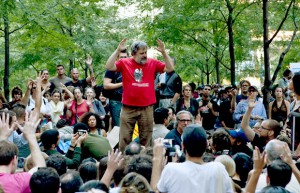 A phat-ass tax on the profits they do make selling “financial products” to the public should also be mandatory. You’re landlord at college can’t stop you from having that blow out house-party during your last week of school, but you can bet he’s gonna keep your security deposit. Same should go for the Street: if your product ends up beer stained and urine soaked, someone somewhere should get something in return. Consequences are the first thing we want our children to comprehend. What happened to them for adults? Where is our security?
A phat-ass tax on the profits they do make selling “financial products” to the public should also be mandatory. You’re landlord at college can’t stop you from having that blow out house-party during your last week of school, but you can bet he’s gonna keep your security deposit. Same should go for the Street: if your product ends up beer stained and urine soaked, someone somewhere should get something in return. Consequences are the first thing we want our children to comprehend. What happened to them for adults? Where is our security?
 It wouldn’t take much to apply Ockham’s Razor to the plethora of bullshit exemptions Wall Street insiders have slid into our now cancer ridden economic policies. Amazing how tame the Occupy movement is in D.C. considering the proximity those protesters have to tangible corruption. I just wish we had our own pair of left leaning Koch Brothers: two ruthlessly liberal entrepreneurs with uber-deep pockets able to mobilize an army of political insiders and loophole lawyers– all for the good of the 99 percent.
It wouldn’t take much to apply Ockham’s Razor to the plethora of bullshit exemptions Wall Street insiders have slid into our now cancer ridden economic policies. Amazing how tame the Occupy movement is in D.C. considering the proximity those protesters have to tangible corruption. I just wish we had our own pair of left leaning Koch Brothers: two ruthlessly liberal entrepreneurs with uber-deep pockets able to mobilize an army of political insiders and loophole lawyers– all for the good of the 99 percent.
 For now, it’s just us under-connected intellectuals. We have to keep asking the hard questions. How much longer will we continue to give the wealthiest rock- bottom tax rates on capital gains? Is it even possible any more to use the system to change the system? Or is an actual revolution the only way? That’s a tough question, because the truth is the government is NOT broken. The people who run it are.
For now, it’s just us under-connected intellectuals. We have to keep asking the hard questions. How much longer will we continue to give the wealthiest rock- bottom tax rates on capital gains? Is it even possible any more to use the system to change the system? Or is an actual revolution the only way? That’s a tough question, because the truth is the government is NOT broken. The people who run it are.
Think for a moment about the genealogy of the Wall Street moniker. The dominant explanation (there are several) is that Dutch Imperialists saw the writing on the wall when British and other Europeans came to New York’s Manhattan Island to share the wealth the safe harbor provided. So they constructed a twelve-foot wall to keep the Brits–and everyone else who was a potentially dangerous enemy to their bottom line– out of New Amsterdam, including the Lenape Indians.
 They Lenape’s got a whopping 60 guilders for their land. They were also lead to believe that the Dutch “occupation” was a temporary one. You know the story. It hasn’t changed much from then either. The irony that “de Waale Straat” is still trying to keep people out shouldn’t be lost on anyone. It was built on that foundation, and by slaves no less; the true 99 percent. It remains as exclusive a settlement as ever.
They Lenape’s got a whopping 60 guilders for their land. They were also lead to believe that the Dutch “occupation” was a temporary one. You know the story. It hasn’t changed much from then either. The irony that “de Waale Straat” is still trying to keep people out shouldn’t be lost on anyone. It was built on that foundation, and by slaves no less; the true 99 percent. It remains as exclusive a settlement as ever.
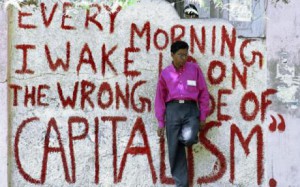 So what are we to do when Capitalism’s promise has been rendered incoherent? Or worse, when it’s been revealed as a ponzi scheme? After Madoff, are we so surprised. The promise of the premise is still being hawked by the GOP. Let capitalism go unchecked, and we’ll all be better off, they claim. Less regulation sparks competition and innovation. It all trickles down eventually.
So what are we to do when Capitalism’s promise has been rendered incoherent? Or worse, when it’s been revealed as a ponzi scheme? After Madoff, are we so surprised. The promise of the premise is still being hawked by the GOP. Let capitalism go unchecked, and we’ll all be better off, they claim. Less regulation sparks competition and innovation. It all trickles down eventually.
 We know it’s all hooey now. Corporations don’t share the wealth, and pollution does not improve if it goes unregulated, (and the poor do not show mercy when they eventually drag the rich into the street and decapitate them publicly.) It’s been hooey since the first clan of Neanderthals took over the biggest cave, next to the river filled with the most fish and the bushes with the most berries. Those featherless bipeds were not about to tell all the other tribes to come share the wealth. Instead, they built weapons. It’s instinctual, it seems: to fuck your neighbor out of whatever you can. But some optimists like Steven Pinker are claiming the 500,000 years of evolution since then have endowed us with the mental capacity to imagine more than that.
We know it’s all hooey now. Corporations don’t share the wealth, and pollution does not improve if it goes unregulated, (and the poor do not show mercy when they eventually drag the rich into the street and decapitate them publicly.) It’s been hooey since the first clan of Neanderthals took over the biggest cave, next to the river filled with the most fish and the bushes with the most berries. Those featherless bipeds were not about to tell all the other tribes to come share the wealth. Instead, they built weapons. It’s instinctual, it seems: to fuck your neighbor out of whatever you can. But some optimists like Steven Pinker are claiming the 500,000 years of evolution since then have endowed us with the mental capacity to imagine more than that.
 There are two arguments being made at present. One says that we will ride out this rough patch and re-concept our finincial systems, and our technology, and our labor practices to find a flow that eventually does spread the wealth. We’re just in the middle of the seismic lurch it will take to get us there. The other viewpoint says that all of the above will never find a flow, only slowly decline while clinging desperately to whatever vestiges of the old structure remain. The tiger-blood will never change its DNA.
There are two arguments being made at present. One says that we will ride out this rough patch and re-concept our finincial systems, and our technology, and our labor practices to find a flow that eventually does spread the wealth. We’re just in the middle of the seismic lurch it will take to get us there. The other viewpoint says that all of the above will never find a flow, only slowly decline while clinging desperately to whatever vestiges of the old structure remain. The tiger-blood will never change its DNA.
 Fortunately, our civilization seems to excel during crisis. Thank god we’re finally having one. The more reflection and transformation and action the better. And for anyone who’s actually been to any of these Occupations (and if you haven’t why not?) you can see that Capitalism is alive and well. It’s happening all around it. T-shirt vendors and food trucks and musicians are all making a buck, and the “Occupy” brand is about to be tradmarked. But what they’re not doing is hording it all and using it to manipulate others in lesser powerful positions. It’s a wide open welcome to one and all to participate communally, even if just rhetorically, in challenging the status quo.
Fortunately, our civilization seems to excel during crisis. Thank god we’re finally having one. The more reflection and transformation and action the better. And for anyone who’s actually been to any of these Occupations (and if you haven’t why not?) you can see that Capitalism is alive and well. It’s happening all around it. T-shirt vendors and food trucks and musicians are all making a buck, and the “Occupy” brand is about to be tradmarked. But what they’re not doing is hording it all and using it to manipulate others in lesser powerful positions. It’s a wide open welcome to one and all to participate communally, even if just rhetorically, in challenging the status quo.
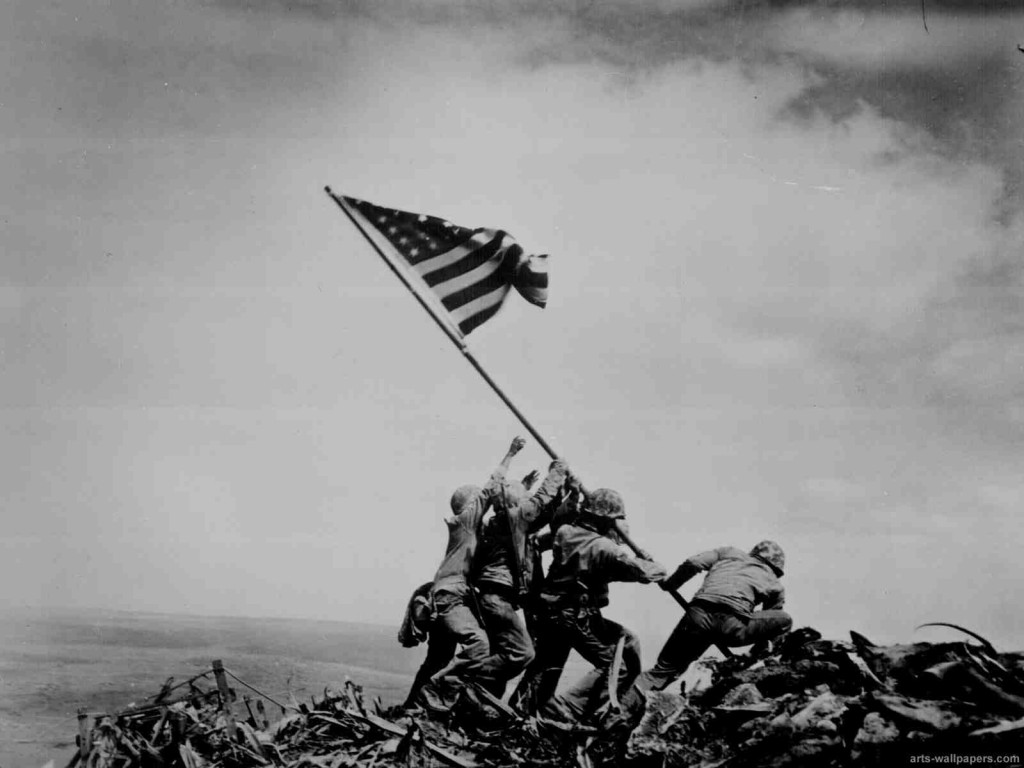 What the final results will be remain questionable. We can look to the French and Russian revolutions for the various outcomes we can expect from movements like this. Or we can continue to imagine our own; one that sets a precedent far more salient to the future of a fully interconnect, truly globalized world. It’s up in the air at the moment, but that’s a better place to be than stuck behind a wall.
What the final results will be remain questionable. We can look to the French and Russian revolutions for the various outcomes we can expect from movements like this. Or we can continue to imagine our own; one that sets a precedent far more salient to the future of a fully interconnect, truly globalized world. It’s up in the air at the moment, but that’s a better place to be than stuck behind a wall.




Permalink
Alex
Let me kiss your ass for a few seconds…you are funny, insightful and serious. I enjoy reading your commentary and would love to see more of this type of journalism, of course you would have to be assassinated, but hey, sometimes you have to live by the pen and die by the sword.